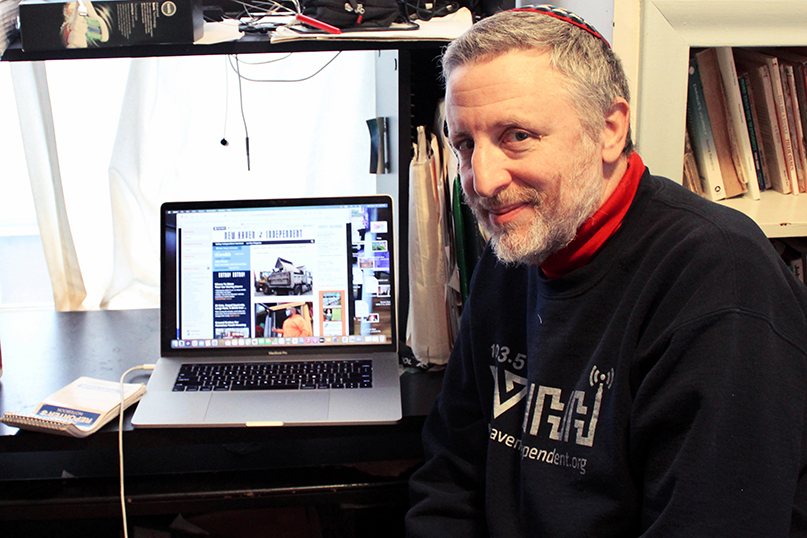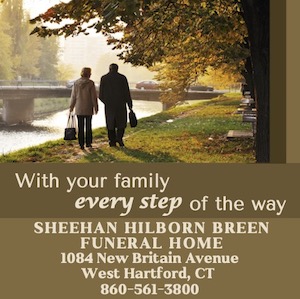
By Stacey Dresner
NEW HAVEN – Several years ago, journalist Paul Bass met with Rabbi Michael Whitman, then spiritual leader of Young Israel of New Haven, to discuss loshon hora – “evil tongue” in Hebrew, or speaking ill of others – and the Chafetz Chaim, which covers ethics and the laws of speech.
At that time, Bass and his wife, Carole Bass, also a journalist, were preparing for a course they would soon teach about loshon hora and journalism at The Havurah Institute.
For Bass, an observant Jew and the founder of the nonprofit digital newspaper The New Haven Independent, seeking rabbinical guidance about loshon hora was more than a theoretical exercise.
“It’s an important part of how I think about life and my work,” he said.
Bass’s work at The Independent is to provide in-depth news coverage of New Haven – or, as per his newspaper’s website, “Its neighborhoods. Its government. Its people – from the knuckleheads to the dreamers and schemers, and everyone in between.”
With reporter’s notebook in hand and a knitted kippah perched on his head, Bass, 60, can be found out and about – at public meetings; at the courthouse checking records, and just about anywhere and everywhere news is happening in the city of New Haven.
“I’ll never lose the thrill of going, with notebook and camera in hand and meeting somebody, finding out something interesting they are doing,” he told the Ledger. “Public meetings are our bread and butter. I like all kinds of stories. There’s really not a story I don’t like to do.”
Over the past 15 years, Bass and his small staff of reporters have dug into local stories, not just reporting the news, but helping to bring about change.
“There has been a whole traffic calming movement that started from our reporting in the early years: police accountability, zoning, economic development, criminal justice – just caring about and debating from all points of view,” Bass says, not boastfully, but matter-of-factly.
“Paul is to my mind, and I say it with the highest respect for journalists, the old fashion reporter,” Rabbi Herbert Brockman, rabbi emeritus of Hamden’s Congregation Mishkan Israel, told the Ledger. “That is, one who respects his readers and works hard to tell the story truthfully in the belief that the more informed we are, the better the community will be. And making our community a better place has always been Paul’s mission, his life’s mission. The story was never about him, but about the people, real people. He is at the top professionally.
“I see Paul in the mold of the early 20th century Yiddish newspapermen [who wrote for the] Forwarts, Morgan Journal, Der Tog. Paul’s neshama [soul] grows out of the belief that news was life and life was news and to spread it around to the grineh yidden [Jewish immigrants] and help them become better Jews and better menschen was his goal. He is a Connecticut treasure.”
Bass feels “incredibly lucky” to have served the New Haven community.
“We have covered New Haven for 40 years. I feel like I’m just starting to get it figured out. Being a reporter connects you to a community and helps you. Your notebook’s a passport, so that you can visit other people’s lives, get behind borders to get a deeper understanding of how a city operates,” he says.
While its comprehensive coverage of New Haven and its mission to make the community a better place is the hallmark of The Independent, the news site has also been a trailblazer in the world of digital publications.
“We were one of the first two in the country to be an online only, local nonprofit professional newsroom, where you have a salary and healthcare insurance and cover daily news online only in the NPR non-profit news model,” Bass says. “Now there are over 300 in the association called INN, the Institute for Nonprofit News. But in the early years – like the first five years – there would be six of us and they would fly us to all of the conferences. Now we’re like a little blip.”
Some ‘little blip.’ In 2013 The Independent was featured in The Wired City: Reimagining Journalism and Civic Life in the Post-Newspaper Age, a book by Dan Kennedy, exploring the growth of online news.
“People studied us and we helped a bunch get started by giving advice,” Bass says.
Now, The New Haven Independent has a sister publication, The Valley Independent Sentinel, covering the lower Naugatuck Valley; and a companion radio station, WNHH Community Radio, 103.5 FM on the dial and live-streamed on the Independent website. The station broadcasts a number of locally-based talk shows focusing on the economy, crime, the arts, and more. All three are operated under the umbrella of the Online Journalism Project of which Bass is executive director.
Today, The New Haven Independent has a staff of five full time reporters and a crew of freelancers; The Valley Independent has 1.5 full-timers and a few freelancers; and the radio station has 1.5 full time employees and 20 volunteer hosts, the majority Latino and African American members of the community.
“We partner with La Voz Hispana, the Spanish newspaper, our offices are together. We run the radio station together and we share material content,” Bass says.
The combined budget for the operation is $670,000. Funding comes from individual contributions and large philanthropic donors and grants from foundations like The Seedlings Foundation, The Community Foundation of Greater New Haven, the Peter and Carmen Lucia Buck Foundation, and The Valley Foundation in Derby.
“I see journalism as being tied into being Jewish”
The New Haven Independent actively reports stories five days a week, and one of the two days off is Saturday because Bass does not – and will not –cover the news on Shabbat.
“Since the ‘90s we haven’t driven or worked or used computers or phones or anything like that. I love that. Shabbat and chagim [holidays] really keep me focused. They replenish me, ground me,” says Bass, who considers himself “Conservadox” and belongs to Beth El-Keser Israel or BEKI, the Conservative synagogue in New Haven.
“I see Journalism as being tied into being Jewish. Everything from our concern with the word, to having a purpose in life,” Bass says.
Likewise, eschewing loshon hora has become a part of his reporting.
“I think about it every day. It’s not as simple as ‘you never say something bad about somebody.’ It’s more complicated,” he explains. “It’s about the necessity of bringing forth unpleasant information that can have a constructive purpose, versus the necessity not to humiliate people. And everyday you navigate that tension.”
Bass dedicated efforts not to spread loshon hora have become an ingrained policy at The Independent.
For example, he says, “We will not print the name of someone arrested, unless they are outliers and people command us…unless we get their side, talk about how a case is resolved, or if they are public figure… that is one thing that we do that I would say is very much in keeping with what I’m thinking about on Shabbat.”
Bass hasn’t always been shomer Shabbos.
“I didn’t grow up observant. I did have a bar mitzvah. We lit the candles until I was eight and my mother died. And after that we didn’t like candles,” Bass said. “I always loved being Jewish; we weren’t observant. But then I got I got observant in my early 30s with my family. That was nice.”
When my kids were really young we started to light candles and started learning more and going kosher, and observing Shabbos and going to shul. When my first daughter had her bat mitzvah we started doing tefillin every day together.
That was years ago, 1993 or 94.”
The White Plains, N.Y. native has been a hard-boiled new reporter since second grade.
“I put out little newspapers,” he laughed. “And then I started working on school papers and in high school I started working for the local daily in White Plains.”
Upon graduation from Yale University in 1982, where he had worked on the Yale Daily News and also wrote for the New Haven Register and New Haven Advocate, Bass stayed in New Haven where he freelanced for several years at publications like the Sunday New York Times, USA Today and Connecticut Magazine.
In 1986, Bass and his wife Carole, also a Yale graduate, started a weekly print version of The New Haven Independent. When they terminated it in 1989, Bass began working for the Advocate full time. In 2004, he took off a year to write a book, Murder in the Model City: The Black Panthers, Yale, And the Redemption of a Killer.
In 2005, he and Carole started the digital version of The New Haven Independent to fill what he saw as a void in the city as local newspapers shrank or disappeared.
“I think New Haven local news coverage was disappearing before 2005,” Bass says. “But once we started up and started covering the zoning board, and the school board, and local politics and neighborhoods, all of a sudden others competed with us again. Even though we weren’t competing for revenue. So it was an ideal situation. The competition was for stories, not for revenue, so more money started supporting more reporting. …I think we’re not a news desert anymore. People are more involved.”
And the Independent’s brand of digital journalism enables it to get late-breaking news coverage to its audience much quicker than traditional print newspapers.
For example, during the Black Lives Matter protests in May, Bass was on hand to cover what he thought would be a tiny march that no one knew about. Next thing he knew, “here were thousands marching onto the highway, onto I-95 and facing off with the State Police and I was doing a Facebook Live video. Fifty-thousand people watched. And lots of people came,” he recalls.
“And then when the Christopher Columbus statue was taken down our reporter was the only person [who] did a Facebook Live video that showed a fight that broke out, and half a million people watched it. It became the basis for legal proceedings because that was the only capturing of what actually happened.”
Having that kind of influence, he says, “is fun.”
“During COVID and Black Lives Matter it reinforced for us how much people count on this local digital media to get information to connect with each other.”
In the Jewish community, Bass presented thorough coverage of Rabbi Daniel Greer’s arrest and conviction for sexual abuse and rape. And he has also highlighted crime that has affected the growing Chabad community in New Haven’s Beaver Hills neighborhood as well as the opening of new kosher businesses.” (Read “Crime Wave Rattles, Unites New Haven Neighborhood,” reprinted by the Ledger, Nov. 3).
“I think it is a great time to be a local journalist – it’s thriving,” Bass says. “It’s more fun to do this kind of journalism because you can come in and link video photography and writing old-fashioned text, and tell stories in a lot of different ways. You’re more connected to your readers. Your opinion matters less than your reporting and thinking counts more, which is fun.”
Covid-19 has not slowed the Independent staff down.
“We have been working at home since March. We’ll probably go back to the office in the summer. We’re working out in the field everyday, but we’re taking a lot of precautions. We’re not going indoors for the most part. But all digitals have gotten a lot more readers during the pandemic,” said Bass.
He wrote a piece on his brother’s death right as Covid struck, and the adjustments they had to make while attempting to give him a traditional Jewish funeral. (The piece also ran in the Ledger, March 30, 2020. The Ledger often reprints New Haven Independent stories.)
Just another example of the melding of Bass’s journalism and Judaism.
“I always say being a Jew is part of being a journalist. You want to have a purpose to your life that leaves it better than when you started – just a little better; and that you have to incorporate the values of what it means to be a good human being to be part of a community. I think that is definitely part of the mission of a Jew,” he says. “It’s good though. It’s good to be a Jewish journalist because, you do get a day off, and you have centuries worth of thought and discussion about what a purposeful life is and how to be a part of a community that inform your work.”
Main Photo: Paul Bass, editor of the New Haven Independent in the office of his Westville home where he has continued to churn out stories since the beginning of Covid-19.








 Southern New England Jewish Ledger
Southern New England Jewish Ledger









